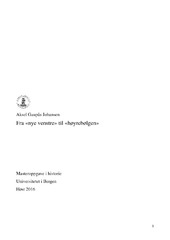| dc.contributor.author | Johansen, Aksel Gaupås | |
| dc.date.accessioned | 2017-01-19T10:39:02Z | |
| dc.date.available | 2017-01-19T10:39:02Z | |
| dc.date.issued | 2016-11-20 | |
| dc.date.submitted | 2016-11-20 | eng |
| dc.identifier.uri | https://hdl.handle.net/1956/15469 | |
| dc.description.abstract | This master thesis argues that an essential condition for the neoliberal turn around 1980 was the redeployment of the ideas and values central to the protest-movements and the youthful revolts of the 1960s. More precisely, it argues that the ideas that motivated the radicals in these two tumultuous decades also, paradoxically, helped bringing about this later ideological shift. The thesis attempts to designate, by the use of the term «radical individualism», a whole family of ideals and aspirations that were central to the countercultures and political movements of the 1960s. This «individualism», contained a rhetoric of freedom that may have paved the way for the ideology of the free market and the final break with the social democratic order of the post war era. Closely related to this development were attempts to modernize capitalist culture by means of an older anti-capitalist critique. This thesis highlights the connection between radical theories of alienation and post-bureaucratic theories of management and organization seeking to maximize personal motivation and creativity. Finally the thesis shows that a romantic «artistic critique» central to the aspirations of the rebels of the 1960s has been absorbed into modern corporate rhetoric aiming at entrepreneurship and innovation. The necessary comparative operations are made possible by constructing «ideal types» in a tradition of Weber, and, technically, by means of «cluster analysis» as practiced in the tradition of rhetorical criticism. | en_US |
| dc.description.abstract | This master thesis argues that an essential condition for the neoliberal turn around 1980 was the redeployment of the ideas and values central to the protest-movements and the youthful revolts of the 1960s. More precisely, it argues that the ideas that motivated the radicals in these two tumultuous decades also, paradoxically, helped bringing about this later ideological shift. The thesis attempts to designate, by the use of the term «radical individualism», a whole family of ideals and aspirations that were central to the countercultures and political movements of the 1960s. This «individualism», contained a rhetoric of freedom that may have paved the way for the ideology of the free market and the final break with the social democratic order of the post war era. Closely related to this development were attempts to modernize capitalist culture by means of an older anti-capitalist critique. This thesis highlights the connection between radical theories of alienation and post-bureaucratic theories of management and organization seeking to maximize personal motivation and creativity. Finally the thesis shows that a romantic «artistic critique» central to the aspirations of the rebels of the 1960s has been absorbed into modern corporate rhetoric aiming at entrepreneurship and innovation. The necessary comparative operations are made possible by constructing «ideal types» in a tradition of Weber, and, technically, by means of «cluster analysis» as practiced in the tradition of rhetorical criticism. | en_US |
| dc.format.extent | 1007835 bytes | eng |
| dc.format.mimetype | application/pdf | eng |
| dc.language.iso | nob | eng |
| dc.publisher | The University of Bergen | eng |
| dc.subject | antibyråkratisk ledelsesteori | eng |
| dc.subject | fremmedgjøring | eng |
| dc.subject | kunstnerkritikk | eng |
| dc.subject | det nye venstre | eng |
| dc.subject | kunst og næring | eng |
| dc.subject | radikal individualisme | eng |
| dc.subject | høyrebølgen | eng |
| dc.title | Fra "nye venstre" til "høyrebølgen" | eng |
| dc.type | Master thesis | |
| dc.rights.holder | Copyright the author. All rights reserved | eng |
| dc.description.degree | Master i Historie | |
| dc.description.localcode | MAHF-HIS | |
| dc.description.localcode | HIS350 | |
| dc.subject.nus | 713107 | eng |
| fs.subjectcode | HIS350 | |
